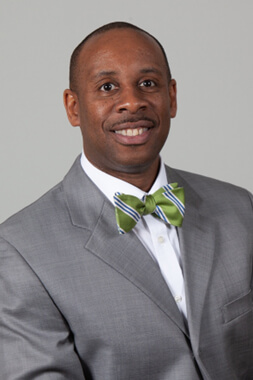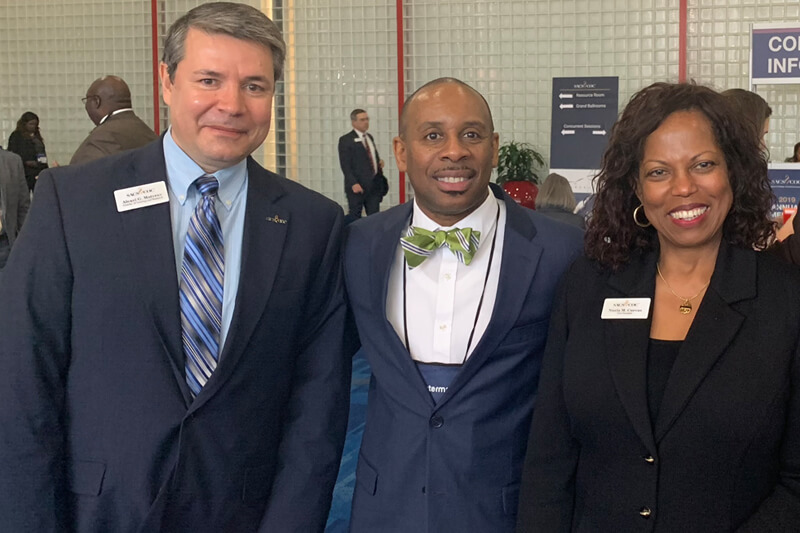BIOGRAPHY

Dr. Leroy Hamilton, Jr.
Dr. Leroy Hamilton, Jr. has had varied experiences in higher education. An administrator with broad experience, Dr. Hamilton has held executive leadership positions as Provost and Vice President for Academic Affairs, Special Assistant to the President, Interim Provost and Vice President for Academic Affairs, as well as Vice Provost for Academic Effectiveness. He has also served as a professor, an academic dean, an executive director of an academic advising unit for a freshman-year experience initiative, and as a director of a student-services unit.
Dr. Hamilton has been fruitful in developing support systems for student success and engagement. At several institutions, Dr. Hamilton pioneered college-wide “One-Stop” Student Success Centers that consolidated enrollment management, student services, and a first-year experience office to streamline processes that affect student retention and graduation rates. He also implemented an innovative model for academic advising, revamped a student orientation program, and instituted a student development plan. These higher education experiences have required that Dr. Hamilton supervise and manage campus staff and operations in various settings, including off-site campus centers and multi-campus units.
Dr. Hamilton has wide-ranging experience with institutional effectiveness. As the institutional liaison for the Southern Association of Colleges and Schools (SACSCOC), Dr. Hamilton led community colleges and four-year institutions through their decennial reaffirmation of accreditation reviews. This successful effort required him to assemble and create a cohesive group of administrators, faculty, staff, and students to review all aspects of academic, fiscal, and other campus operations. He served as a member of a SACSCOC Ad Hoc Committee on Substantive Change, worked as a SACSCOC peer-evaluator, and conducted student success workshops at SACSCOC annual meetings. Further, he participated in the implementation of a SACSCOC Quality Enhancement Plan and served as a liaison to the Middle States Commission on Higher Education (MSCHE), the Maryland Higher Education Commission (MHEC), the State Council of Higher Education in Virginia (SCHEV), and the Southern Regional Education Board. On that Board, Dr. Hamilton coordinated the Academic Common Market application process.

Through shared governance and transparency, Dr. Hamilton has worked in tandem with the faculty and staff to develop new academic programs and conduct ongoing assessments of the curriculum for the continuous improvements of existing academic programs. Through his increased levels of progressive leadership in academic affairs, he has used data to ensure the relevance of academic programs through ongoing curriculum development, facilitating program review, and assessing the results of measurable student outcomes. Specifically, he has a proven track record in curriculum management, budgeting, and strategic planning, and integrating employable skillsets throughout the curriculum.
As an administrator who has worked collaboratively and successfully with the Faculty Senate, Staff Senate, and the Student Government Association, Dr. Hamilton values shared governance. He believes that to be effective, people leadership must be based on trust, transparency, and inclusion to fulfill the College’s mission, maintain, and advance its financial goals, strengthen its programs, and maintain or enhance its reputation. As an executive leader, Dr. Hamilton has proven to lead wisely and well, making informed decisions—influenced by the input, strengths, aspirations, and needs of all college constituencies.
People leadership is a concept that encourages leaders to take time to understand faculty and academic staff, identify their strengths, and explore what motivates retention among junior and senior faculty. To support this effort, Dr. Hamilton has worked collaboratively with deans and department chairs to recruit, retain, and develop faculty and academic staff. That said, he developed and enhanced a Center for Teaching and Learning, established faculty mentoring programs, conducted professional development workshops, and established faculty retention initiatives to support faculty retention during the promotion and tenure process. More specifically, Dr. Hamilton has led teams in developing assessment plans to monitor the effectiveness of academic program outcomes and coordinated recruitment efforts to attract high-quality faculty and staff. Data show that his efforts were effective and fruitful.
Dr. Hamilton has engaged in strategic planning. Most recently, he led an academic affairs division team in developing an ambitious 5-year strategic plan. This plan established goals for recruiting, retaining, and preparing underrepresented minorities, first-generation, and low-income students for success in degree programs, especially in occupations with earnings that matched or exceeded those of their peers. The plan also supported faculty and community development and focused on student enrollment and retention, academic programs, diversity, graduate studies, and community engagement.
Strategic planning is a model of management that Dr. Hamilton has successfully used to inspire and empower faculty to create positive innovations to address new and emerging trends in higher education. He has led teams to develop strategic plans and priorities and create policy formulations that affect academic, fiscal, and campus operational activities that align with organizational strategic plans and priorities. He has a proven track record related to curriculum management, and budgeting, as well as to the supervision of faculty and staff personnel. Entrusted with the mantle of administrative leadership, Dr. Hamilton has collaborated with Boards, staff, and internal and external stakeholders to develop programs to address the demands in higher education.
In the area of technology, Dr. Hamilton enhanced the infrastructure for online programs and equipped a student-success center with technology-assisted classrooms and laboratories. These innovations and enhancements worked in tandem to support student achievement, increase retention, and boost graduation rates. Through targeted technology use, the Academic Affairs Division was able to schedule, track, document, and assess the degree of effectiveness of student services.
A published author and researcher, Dr. Hamilton has presented at numerous regional, national, and international conferences on topics such as developmental education reform, academic program review, curriculum mapping, the role of collegiality in supporting faculty retention, and the necessity for campus-wide synergism to retain students and foster their success. As an experienced grant writer, Dr. Hamilton has secured more than 3.1 million dollars in external funds to develop student academic support systems.
Dr. Hamilton has reached beyond campuses into communities to establish mutually beneficial partnerships. For example, he provided leadership to engineer a partnership with a municipality to develop an incubation center for business start-ups. This partnership provided practical knowledge and entrepreneurial experience for students and the community. Further, by establishing an active presence on campus and within the community, Dr. Hamilton expanded partnerships and community engagement with alumni, community organizations, agencies, other higher education institutions, and business entities. He also worked collaboratively with internal and external stakeholders that provided opportunities and experience for students.
Dr. Hamilton has held membership in several organizations, including the Golden Key International Honor Society, Kappa Delta Pi International Honor Society in Education (KDP), Sigma Tau Delta International English Honor Society, Historically Black College & Universities (HBCU) Faculty Development Network, National Association for the Advancement of Colored People (NAACP), the National Council of Teachers of English, Professional and Organizational Development (POD), The New Chesapeake Men for Progress, Virginia Association of Teachers of English (VATE), SACSCOC Ad Hoc Committee on Substantive Change, and Who’s Who Among American Teachers. In addition, he is a life member of Omega Psi Phi Fraternity, Inc., a community service organization.
Dr. Hamilton is a devoted husband and father, who resides in Chesapeake, Virginia.
Read More
